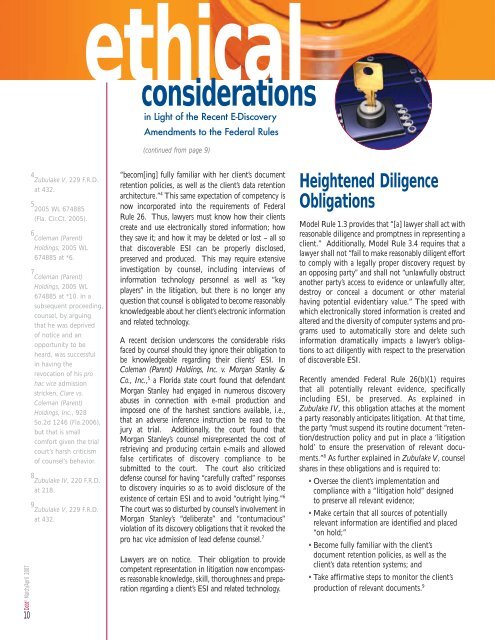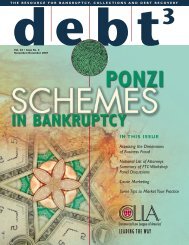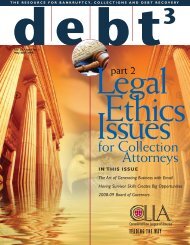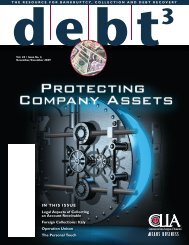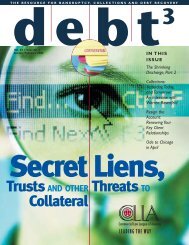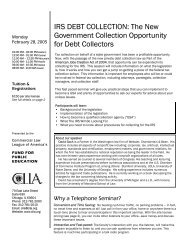leading the way - Commercial Law League Of America
leading the way - Commercial Law League Of America
leading the way - Commercial Law League Of America
You also want an ePaper? Increase the reach of your titles
YUMPU automatically turns print PDFs into web optimized ePapers that Google loves.
ethical<br />
considerations<br />
in Light of <strong>the</strong> Recent E-Discovery<br />
Amendments to <strong>the</strong> Federal Rules<br />
(continued from page 9)<br />
Debt 3 March/April 2007<br />
10<br />
4 Zubulake V, 229 F.R.D.<br />
at 432.<br />
5 2005 WL 674885<br />
(Fla. Cir.Ct. 2005).<br />
6 Coleman (Parent)<br />
Holdings, 2005 WL<br />
674885 at *6.<br />
7 Coleman (Parent)<br />
Holdings, 2005 WL<br />
674885 at *10. In a<br />
subsequent proceeding,<br />
counsel, by arguing<br />
that he was deprived<br />
of notice and an<br />
opportunity to be<br />
heard, was successful<br />
in having <strong>the</strong><br />
revocation of his pro<br />
hac vice admission<br />
stricken, Clare vs.<br />
Coleman (Parent)<br />
Holdings, Inc., 928<br />
So.2d 1246 (Fla.2006),<br />
but that is small<br />
comfort given <strong>the</strong> trial<br />
court’s harsh criticism<br />
of counsel’s behavior.<br />
8 Zubulake IV, 220 F.R.D.<br />
at 218.<br />
9 Zubulake V, 229 F.R.D.<br />
at 432.<br />
“becom[ing] fully familiar with her client’s document<br />
retention policies, as well as <strong>the</strong> client’s data retention<br />
architecture.” 4 This same expectation of competency is<br />
now incorporated into <strong>the</strong> requirements of Federal<br />
Rule 26. Thus, lawyers must know how <strong>the</strong>ir clients<br />
create and use electronically stored information; how<br />
<strong>the</strong>y save it; and how it may be deleted or lost – all so<br />
that discoverable ESI can be properly disclosed,<br />
preserved and produced. This may require extensive<br />
investigation by counsel, including interviews of<br />
information technology personnel as well as “key<br />
players” in <strong>the</strong> litigation, but <strong>the</strong>re is no longer any<br />
question that counsel is obligated to become reasonably<br />
knowledgeable about her client’s electronic information<br />
and related technology.<br />
A recent decision underscores <strong>the</strong> considerable risks<br />
faced by counsel should <strong>the</strong>y ignore <strong>the</strong>ir obligation to<br />
be knowledgeable regarding <strong>the</strong>ir clients’ ESI. In<br />
Coleman (Parent) Holdings, Inc. v. Morgan Stanley &<br />
Co., Inc., 5 a Florida state court found that defendant<br />
Morgan Stanley had engaged in numerous discovery<br />
abuses in connection with e-mail production and<br />
imposed one of <strong>the</strong> harshest sanctions available, i.e.,<br />
that an adverse inference instruction be read to <strong>the</strong><br />
jury at trial. Additionally, <strong>the</strong> court found that<br />
Morgan Stanley’s counsel misrepresented <strong>the</strong> cost of<br />
retrieving and producing certain e-mails and allowed<br />
false certificates of discovery compliance to be<br />
submitted to <strong>the</strong> court. The court also criticized<br />
defense counsel for having “carefully crafted” responses<br />
to discovery inquiries so as to avoid disclosure of <strong>the</strong><br />
existence of certain ESI and to avoid “outright lying.” 6<br />
The court was so disturbed by counsel’s involvement in<br />
Morgan Stanley’s “deliberate” and “contumacious”<br />
violation of its discovery obligations that it revoked <strong>the</strong><br />
pro hac vice admission of lead defense counsel. 7<br />
<strong>Law</strong>yers are on notice. Their obligation to provide<br />
competent representation in litigation now encompasses<br />
reasonable knowledge, skill, thoroughness and preparation<br />
regarding a client’s ESI and related technology.<br />
Heightened Diligence<br />
Obligations<br />
Model Rule 1.3 provides that “[a] lawyer shall act with<br />
reasonable diligence and promptness in representing a<br />
client.” Additionally, Model Rule 3.4 requires that a<br />
lawyer shall not “fail to make reasonably diligent effort<br />
to comply with a legally proper discovery request by<br />
an opposing party” and shall not “unlawfully obstruct<br />
ano<strong>the</strong>r party’s access to evidence or unlawfully alter,<br />
destroy or conceal a document or o<strong>the</strong>r material<br />
having potential evidentiary value.” The speed with<br />
which electronically stored information is created and<br />
altered and <strong>the</strong> diversity of computer systems and programs<br />
used to automatically store and delete such<br />
information dramatically impacts a lawyer’s obligations<br />
to act diligently with respect to <strong>the</strong> preservation<br />
of discoverable ESI.<br />
Recently amended Federal Rule 26(b)(1) requires<br />
that all potentially relevant evidence, specifically<br />
including ESI, be preserved. As explained in<br />
Zubulake IV, this obligation attaches at <strong>the</strong> moment<br />
a party reasonably anticipates litigation. At that time,<br />
<strong>the</strong> party “must suspend its routine document “retention/destruction<br />
policy and put in place a ‘litigation<br />
hold’ to ensure <strong>the</strong> preservation of relevant documents.”<br />
8 As fur<strong>the</strong>r explained in Zubulake V, counsel<br />
shares in <strong>the</strong>se obligations and is required to:<br />
• Oversee <strong>the</strong> client’s implementation and<br />
compliance with a “litigation hold” designed<br />
to preserve all relevant evidence;<br />
• Make certain that all sources of potentially<br />
relevant information are identified and placed<br />
“on hold;”<br />
• Become fully familiar with <strong>the</strong> client’s<br />
document retention policies, as well as <strong>the</strong><br />
client’s data retention systems; and<br />
• Take affirmative steps to monitor <strong>the</strong> client’s<br />
production of relevant documents. 9


